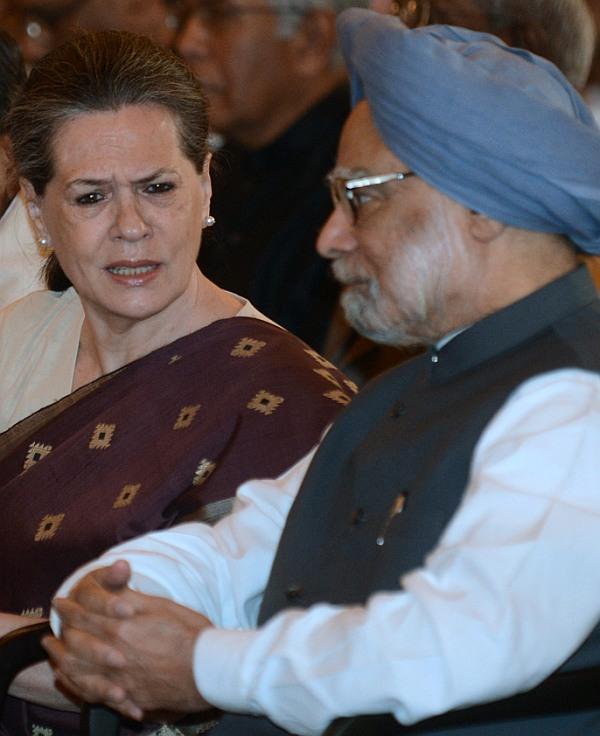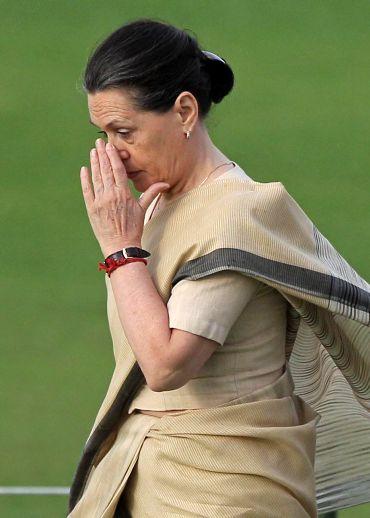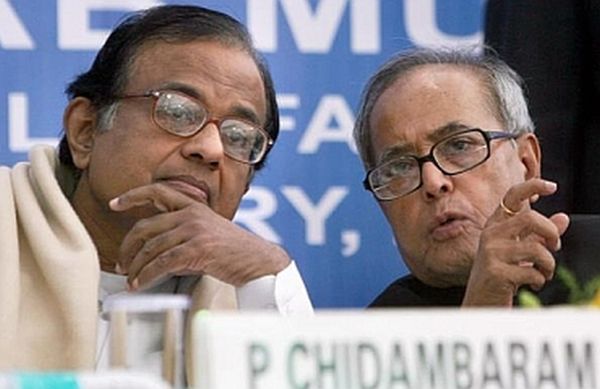Prime Minister Manmohan Singh had been "defanged" by the Congress party in his second term with Sonia Gandhi deciding on key appointments to the Cabinet and to the PMO as he seemed to "surrender" to her and to the United Progressive Alliance constituents.
This picture of a prime minister losing "all vestiges of control over his own government" emerges from a just-published book by a former close aide of his, Sanjaya Baru, who provides an insight into the "cautious equation" between the PM and Congress President and Singh's "often troubled" relations with his ministers.
Baru, a senior editor and PM's media adviser between 2004 and 2008, quotes Singh as having told him that there cannot be two centres of power.
‘That creates confusion. I have to accept that the party president is the centre of power. The government is answerable to the party,’ the PM told him, according to the 301-page book "The Accidental Prime Minister--The Making and Unmaking Of Manmohan Singh" published by Penguin.
...
'In 2009 Singh made the cardinal mistake of imagining the victory was his'
Image: Prime Minister Manmohan Singh with wife Gursharan KaurBaru writes that after he had led the Congress party to electoral victory in 2009 Singh had made "the cardinal mistake of imagining the victory was his". He may have convinced himself that his performance and destiny had again made him the PM, and not Sonia.
"Bit by bit, in the space of a few weeks he was defanged. He thought he could induct the ministers he wanted into his team. Sonia nipped that hope in the bud by offering the finance portfolio to Pranab (Mukherjee), without even consulting him," Baru writes.
Singh had been toying with the idea of appointing his principal economic adviser C Rangarajan, "the comrade with whom he had battled the balance of payments crisis of 1991-92", as finance minister, according to the book.
...
'Sonia's renunciation of power was more a political tactic than higher calling'
Image: Congress President Sonia GandhiThe PM had tried to put his foot down on the induction of A Raja of Dravida Munnetra Kazhagam well before the 2G scam became public knowledge, "but after asserting himself for a full twenty-four hours, caved in to pressure both his own party and the DMK", says Baru.
Baru says that besides resisting the induction of Raja, the PM had also opposed the inclusion of T R Baalu in the Cabinet, "for their unsavoury reputations". He succeeded in the case of Baalu but had to yield ground on Raja.
According to him, Sonia's "renunciation" of power was more a political tactic than higher calling or to an "inner voice" as she put it in June, 2004 after she chose not to take up the post of prime minister despite leading the Congress to electoral success.
"But, while power was delegated, authority was not," he writes, citing the instance of her unsuccessful effort to appoint a retired Tamilian official as Principal Secretary to the PM and to place her trusted aide Pulok Chatterjee in the PMO. The retired official had worked with Rajiv Gandhi but had declined Sonia's invitation.
Such appointments were aimed at ensuring a degree of control over the government in addition to the Congress president having a decisive say in the allocation of portfolios.
...
'Singh shared good working equation with Chidambaram compared to Pranab'
Image: Finance Minister P Chidambaram with President Pranab MukherjeeBaru cites the creation of the National Advisory Council, headed by her, in 2004 as the first sign that Sonia's renunciation of power was a political tactic. It had created a parallel policy structure. Singh had realised that he had no option but to live with it although it seemed that "he was not too comfortable" with it.
No one in Singh's council of ministers seemed to feel that he owed his position, rank or portfolio to him. The final word always was that of leaders of the parties constituting the UPA, says the book.
Referring to senior Congress ministers, Baru says that bringing the politically ambitious Arjun Singh, the left-of-centre A K Antony and the "presumed PM-in-waiting" Pranab Mukherjee into line was always a challenge for the PM. "Each had a mind of his own and each was conscious of his political status and rank".
The book argues that the limits of PM's political authority and the PMO's institutional weakness meant that there was very little control of the PM and his office over the misdemeanours of ministers.
Singh shared a good working equation with Finance Minister P Chidambaram in UPA-I compared to the very formal relationship with Pranab Mukherjee in UPA-II. He would insist that Chidambaram sit with him and finalise the budget speech but Mukherjee would not even show him the draft of the speech till he had finished writing it.
...
'Cong MPs did not see loyalty to the PM as a political necessity'
Image: Defence Minister A K Antony, Prime Minister Manmohan Singh, Congress party chief Sonia Gandhi and former finance minister Pranab MukherjeePhotographs: Reuters
Baru says that for Congress MPs the leader to please was always Sonia. "They did not see loyalty to the PM as a political necessity, nor did Dr Singh seek loyalty in the way Sonia and her aides sought it."
He cites the instance of Jairam Ramesh, then a minister of state, who had embarrassed the PM "by leaking a letter" that Sonia had written to Dr Singh cautioning him against pursuing a Free Trade Agreement with ASEAN. A few weeks later PM's response to that letter had also been leaked to a newspaper allegedly by Ramesh for which he was "reprimanded" by the PM although he denied any role in the leak.
Baru cites his own case when the PM wanted to reappoint him as a secretary in the PMO after the 2009 victory but had later been informed that this had created problems with the Congress party after which Singh had told him that he could not take him back.
"To tell the truth, I was dismayed by the PM's display of spinelessness," he says wondering why Singh had succumbed to the pressure to keep him out.
Looking at the troubles faced by PM in UPA-II, affected as he was by the swirl of corruption allegations against his government, Baru says he was charged not with corruption but with turning a blind eye to the corruption of others.
The political authority and legitimacy that a second term in office offers a head of government was denied to him by his remaining a member of the Upper House and not securing for himself the imprimatur of a popular mandate.
...
'Singh's loyalty enabled him to remain in office, even if not in power'
Image: Prime Minister Manmohan Singh and Congress chief Sonia Gandhi play a folk drumPhotographs: Reuters
"Initially, I saw his subservience as an aspect of his shy and self-effacing personality, but over time I felt, like many, that this might be his strategy for political survival. Was it just unquestioned loyalty to the leader of a survival instinct that prompted him to remain? Whatever the motive, his image took a fatal blow," Baru feels.
"So I, like millions of his middle-class supporters, feel tragically cheated that he has allowed himself to become an object of such ridicule in his second term in office, in the process devaluing the office of the prime minister," says Baru.
He says there are questions that will probably haunt Dr Singh too, most of all: why did he not quit when he realised he had lost all vestiges of control over his own government?
"If his failure to do so arose from loyalty to the Congress or a promise to Sonia, it was misplaced -- and unrewarded -- loyalty. Except it enabled him to remain in office, even if not in power.
"His apparent commitment to ensuring Rahul's succession perpetuating the Congress party's control by one family, was even more misplaced. That was Bheeshma's failure (in Mahabharat) too: he should have put his foot down on the Kaurava succession.
"Moreover, promising loyalty to hereditary succession is a monarchical attribute, not a democratic one. That was Dr Singh's fatal error of judgement," concludes Baru.







article